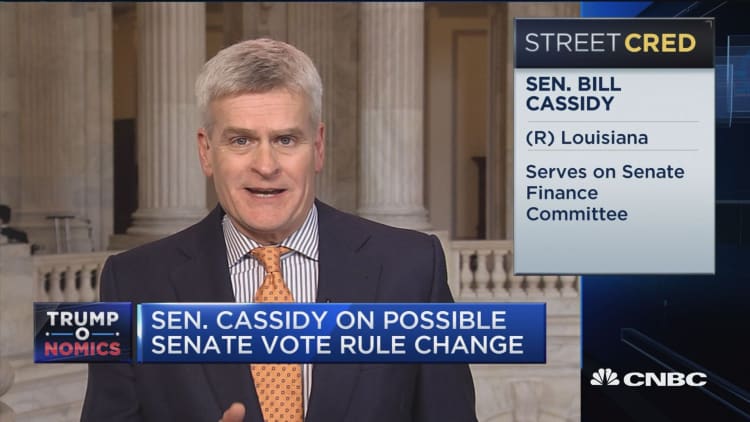
A possible rule change by Republicans to ensure the nomination of President Donald Trump's Supreme Court nominee would "clearly" only be for judicial appointments, not for legislation, Sen. Bill Cassidy, R, Louisiana, told CNBC.
On Monday, a U.S. Senate panel advanced Trump's pick, Neil Gorsuch, to a full Senate vote later in the week. However, Democrats appear to have enough votes to filibuster his nomination.
Cassidy said he believes that would be a first for a Supreme Court nominee.
"It is my understanding that never has there been one filibustered," he said in an interview with "Closing Bell" on Monday.
If Republicans cannot reach the 60 votes needed for Gorsuch's confirmation, they must decide whether to change Senate rules, or trigger the so-called nuclear option, to make it so that its members can limit debate with only a simple majority vote.
Senate Majority Leader Mitch McConnell has suggested he may do so, a move Trump has backed.
"Neil Gorsuch will be confirmed this week. How that happens will really depend on what will happen with our Democratic friends," McConnell told NBC's "Meet the Press" on Sunday.
Cassidy believes at the end of the day, it is important for both parties to come together on solutions for the country.
"We can see that those things that have happened, like civil rights, Medicare, Medicaid, Social Security, that have had an enduring positive effect on our country, have been done in a bipartisan fashion," he said.
"When it's done with one party jamming it through, much like Obamacare, it leads into years of divisiveness."
Cassidy also confirmed he is continuing to work on his health care legislation, despite the House Republicans' recent failure on their bill.
He said he wants to work across the aisle with Democrats.
"I think it's another place if we're going to find something that works across the nation, we need to have both parties involved."
— CNBC's Jacob Pramuk and Reuters contributed to this report.


